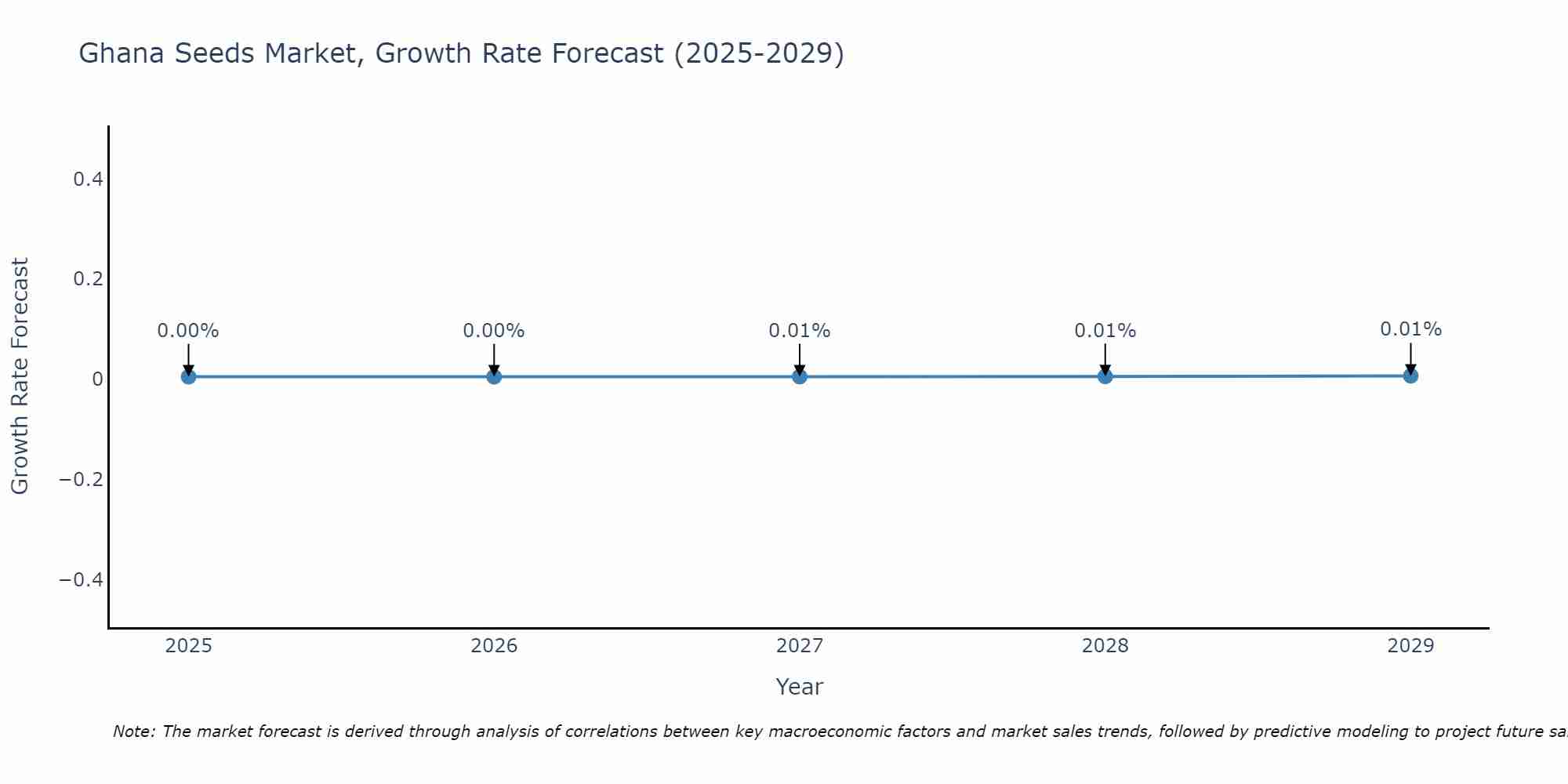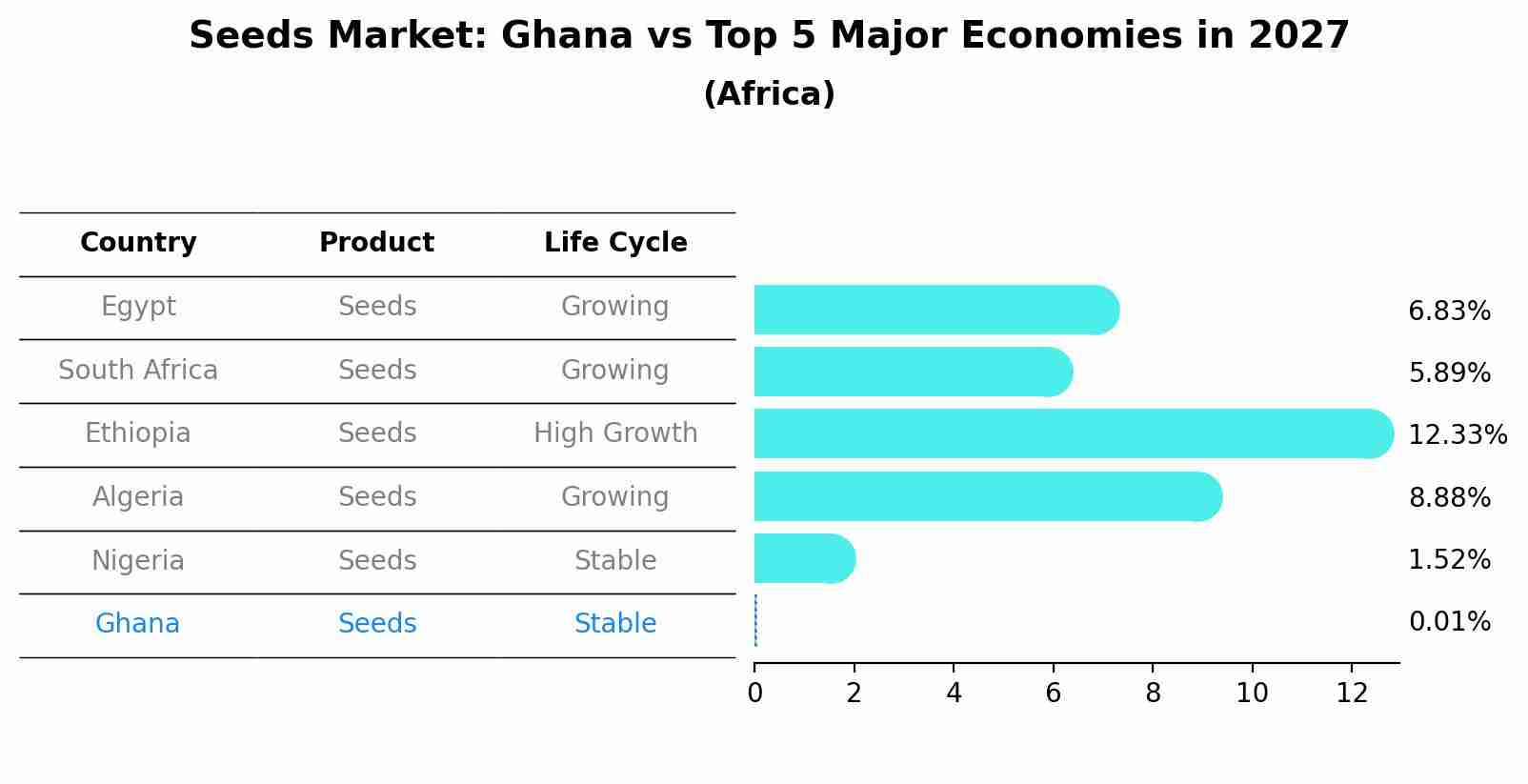Ghana Seeds Market (2025-2031) Outlook | Revenue, Growth, Share, Forecast, Value, Industry, Size, Analysis, Companies & Trends
| Product Code: ETC384716 | Publication Date: Aug 2022 | Updated Date: Jul 2025 | Product Type: Market Research Report | |
| Publisher: 6Wresearch | Author: Vasudha | No. of Pages: 75 | No. of Figures: 35 | No. of Tables: 20 |
Ghana Seeds Market Size Growth Rate
The Ghana Seeds Market is likely to experience consistent growth rate gains over the period 2025 to 2029. From 0.00% in 2025, the growth rate steadily ascends to 0.01% in 2029.

Seeds Market: Ghana vs Top 5 Major Economies in 2027 (Africa)
Ghana's Seeds market is anticipated to experience a stable growth rate of 0.01% by 2027, reflecting trends observed in the largest economy Egypt, followed by South Africa, Ethiopia, Algeria and Nigeria.

Ghana Seeds Market Synopsis
The Ghana Seeds Market is characterized by a growing demand for high-quality seeds driven by the country`s expanding agricultural sector. Maize, rice, and soybean seeds are among the most sought-after varieties due to their importance in the local diet and economy. The market is witnessing a shift towards more hybrid and certified seeds as farmers increasingly recognize the benefits in terms of improved yield and resistance to diseases. Key players in the market include both domestic companies and international seed producers, contributing to a competitive landscape. Government initiatives supporting agricultural development and the adoption of modern farming practices further drive market growth. However, challenges such as access to finance for small-scale farmers and quality control issues remain areas of concern that need to be addressed for sustainable growth in the Ghana Seeds Market.
Ghana Seeds Market Trends
The Ghana Seeds Market is experiencing significant growth driven by increasing demand for high-quality seeds to improve agricultural productivity. There is a growing focus on hybrid and genetically modified seeds that offer higher yields, disease resistance, and improved traits. Farmers are increasingly adopting modern farming practices and technology, leading to a shift towards using certified seeds for better crop production. Additionally, the government`s initiatives to promote agriculture and support smallholder farmers are boosting the seeds market. Companies are investing in research and development to introduce innovative seed varieties tailored to Ghana`s climate and soil conditions. Overall, the Ghana Seeds Market is witnessing a positive trajectory with a strong emphasis on enhancing agricultural sustainability and food security through improved seed technologies.
Ghana Seeds Market Challenges
In the Ghana Seeds Market, various challenges are faced, including limited access to quality seeds, lack of awareness about modern seed varieties and their benefits among farmers, inadequate infrastructure for seed production and distribution, and the presence of counterfeit seeds in the market. Farmers often struggle to obtain certified seeds due to their high cost and limited availability, leading to lower crop yields and productivity. Additionally, the lack of proper regulation and enforcement mechanisms allows for the proliferation of fake seeds, further impacting farmers` livelihoods. Addressing these challenges requires collaborative efforts from government agencies, seed companies, and agricultural extension services to ensure the availability of quality seeds, educate farmers on best practices, and enhance the overall efficiency of the seed supply chain in Ghana.
Ghana Seeds Market Investment Opportunities
The Ghana Seeds Market presents promising investment opportunities due to the country`s increasing focus on agriculture and the government`s initiatives to promote the sector. The market offers potential for growth in the production and distribution of high-quality seeds for crops such as maize, rice, soybeans, and vegetables, driven by the rising demand for improved agricultural productivity. Investors can explore opportunities in seed research and development, seed processing technologies, and establishing seed distribution networks to cater to the needs of Ghanaian farmers. With the government`s support for the agriculture sector through policies and incentives, investing in the Ghana Seeds Market can be a strategic move for those looking to capitalize on the country`s agricultural potential and contribute to food security and economic development.
Jordan Agar Market Government Policies
The Ghanaian government has implemented several policies to regulate and promote the seeds market in the country. The Plant Breeders` Rights Act of 2013 provides a legal framework for the protection of plant breeders` rights and encourages investment in research and development of new seed varieties. The National Seed Plan aims to improve the quality and availability of seeds by promoting the production and distribution of certified seeds. Additionally, the government has established the National Seed Council to oversee the implementation of seed-related policies and ensure compliance with international standards. These policies are designed to enhance food security, promote agricultural productivity, and contribute to sustainable development in Ghana`s agricultural sector.
Ghana Seeds Market Future Outlook
The Ghana Seeds Market is expected to experience steady growth in the coming years due to increasing demand for high-quality seeds to improve agricultural productivity. Factors such as population growth, rising awareness about the benefits of using certified seeds, and government initiatives to promote modern agricultural practices are driving the market expansion. Additionally, the adoption of advanced technologies in seed production and distribution is contributing to the market`s development. As farmers seek to enhance crop yields and adapt to changing climate conditions, there will be a growing preference for improved seed varieties. Overall, the Ghana Seeds Market is poised for growth with opportunities for seed companies to innovate and meet the evolving needs of the agriculture sector.
Key Highlights of the Report:
- Ghana Seeds Market Outlook
- Market Size of Ghana Seeds Market, 2024
- Forecast of Ghana Seeds Market, 2031
- Historical Data and Forecast of Ghana Seeds Revenues & Volume for the Period 2021 - 2031
- Ghana Seeds Market Trend Evolution
- Ghana Seeds Market Drivers and Challenges
- Ghana Seeds Price Trends
- Ghana Seeds Porter's Five Forces
- Ghana Seeds Industry Life Cycle
- Historical Data and Forecast of Ghana Seeds Market Revenues & Volume By Type for the Period 2021 - 2031
- Historical Data and Forecast of Ghana Seeds Market Revenues & Volume By Genetically Modified (GM) Seed for the Period 2021 - 2031
- Historical Data and Forecast of Ghana Seeds Market Revenues & Volume By Conventional Seed for the Period 2021 - 2031
- Historical Data and Forecast of Ghana Seeds Market Revenues & Volume By Crop for the Period 2021 - 2031
- Historical Data and Forecast of Ghana Seeds Market Revenues & Volume By Field Crops for the Period 2021 - 2031
- Historical Data and Forecast of Ghana Seeds Market Revenues & Volume By Fruit & Vegetable Crops for the Period 2021 - 2031
- Historical Data and Forecast of Ghana Seeds Market Revenues & Volume By Availability for the Period 2021 - 2031
- Historical Data and Forecast of Ghana Seeds Market Revenues & Volume By Commercial Seeds for the Period 2021 - 2031
- Historical Data and Forecast of Ghana Seeds Market Revenues & Volume By Saved Seeds for the Period 2021 - 2031
- Historical Data and Forecast of Ghana Seeds Market Revenues & Volume By Seed Treatment for the Period 2021 - 2031
- Historical Data and Forecast of Ghana Seeds Market Revenues & Volume By Treated for the Period 2021 - 2031
- Historical Data and Forecast of Ghana Seeds Market Revenues & Volume By Untreated for the Period 2021 - 2031
- Historical Data and Forecast of Ghana Seeds Market Revenues & Volume By Seed Trait for the Period 2021 - 2031
- Historical Data and Forecast of Ghana Seeds Market Revenues & Volume By Herbicide Tolerant for the Period 2021 - 2031
- Historical Data and Forecast of Ghana Seeds Market Revenues & Volume By Insecticide Resistant for the Period 2021 - 2031
- Historical Data and Forecast of Ghana Seeds Market Revenues & Volume By Other Stacked Traits for the Period 2021 - 2031
- Ghana Seeds Import Export Trade Statistics
- Market Opportunity Assessment By Type
- Market Opportunity Assessment By Crop
- Market Opportunity Assessment By Availability
- Market Opportunity Assessment By Seed Treatment
- Market Opportunity Assessment By Seed Trait
- Ghana Seeds Top Companies Market Share
- Ghana Seeds Competitive Benchmarking By Technical and Operational Parameters
- Ghana Seeds Company Profiles
- Ghana Seeds Key Strategic Recommendations
Frequently Asked Questions About the Market Study (FAQs):
- Single User License$ 1,995
- Department License$ 2,400
- Site License$ 3,120
- Global License$ 3,795
Search
Thought Leadership and Analyst Meet
Our Clients
Related Reports
- Canada Oil and Gas Market (2026-2032) | Share, Segmentation, Value, Industry, Trends, Forecast, Analysis, Size & Revenue, Growth, Competitive Landscape, Outlook, Companies
- Germany Breakfast Food Market (2026-2032) | Industry, Share, Growth, Size, Companies, Value, Analysis, Revenue, Trends, Forecast & Outlook
- Australia Briquette Market (2025-2031) | Growth, Size, Revenue, Forecast, Analysis, Trends, Value, Share, Industry & Companies
- Vietnam System Integrator Market (2025-2031) | Size, Companies, Analysis, Industry, Value, Forecast, Growth, Trends, Revenue & Share
- ASEAN and Thailand Brain Health Supplements Market (2025-2031) | Strategy, Consumer Insights, Analysis, Investment Trends, Opportunities, Growth, Size, Share, Industry, Revenue, Segments, Value, Segmentation, Supply, Forecast, Restraints, Outlook, Competition, Drivers, Trends, Demand, Pricing Analysis, Competitive, Strategic Insights, Companies, Challenges
- ASEAN Bearings Market (2025-2031) | Strategy, Consumer Insights, Analysis, Investment Trends, Opportunities, Growth, Size, Share, Industry, Revenue, Segments, Value, Segmentation, Supply, Forecast, Restraints, Outlook, Competition, Drivers, Trends, Demand, Pricing Analysis, Competitive, Strategic Insights, Companies, Challenges
- Europe Flooring Market (2025-2031) | Outlook, Share, Industry, Trends, Forecast, Companies, Revenue, Size, Analysis, Growth & Value
- Saudi Arabia Manlift Market (2025-2031) | Outlook, Size, Growth, Trends, Companies, Industry, Revenue, Value, Share, Forecast & Analysis
- Uganda Excavator, Crane, and Wheel Loaders Market (2025-2031) | Strategy, Consumer Insights, Analysis, Investment Trends, Opportunities, Growth, Size, Share, Industry, Revenue, Segments, Value, Segmentation, Supply, Forecast, Restraints, Outlook, Competition, Drivers, Trends, Demand, Pricing Analysis, Competitive, Strategic Insights, Companies, Challenges
- Rwanda Excavator, Crane, and Wheel Loaders Market (2025-2031) | Strategy, Consumer Insights, Analysis, Investment Trends, Opportunities, Growth, Size, Share, Industry, Revenue, Segments, Value, Segmentation, Supply, Forecast, Restraints, Outlook, Competition, Drivers, Trends, Demand, Pricing Analysis, Competitive, Strategic Insights, Companies, Challenges
Industry Events and Analyst Meet
Whitepaper
- Middle East & Africa Commercial Security Market Click here to view more.
- Middle East & Africa Fire Safety Systems & Equipment Market Click here to view more.
- GCC Drone Market Click here to view more.
- Middle East Lighting Fixture Market Click here to view more.
- GCC Physical & Perimeter Security Market Click here to view more.
6WResearch In News
- Doha a strategic location for EV manufacturing hub: IPA Qatar
- Demand for luxury TVs surging in the GCC, says Samsung
- Empowering Growth: The Thriving Journey of Bangladesh’s Cable Industry
- Demand for luxury TVs surging in the GCC, says Samsung
- Video call with a traditional healer? Once unthinkable, it’s now common in South Africa
- Intelligent Buildings To Smooth GCC’s Path To Net Zero


















